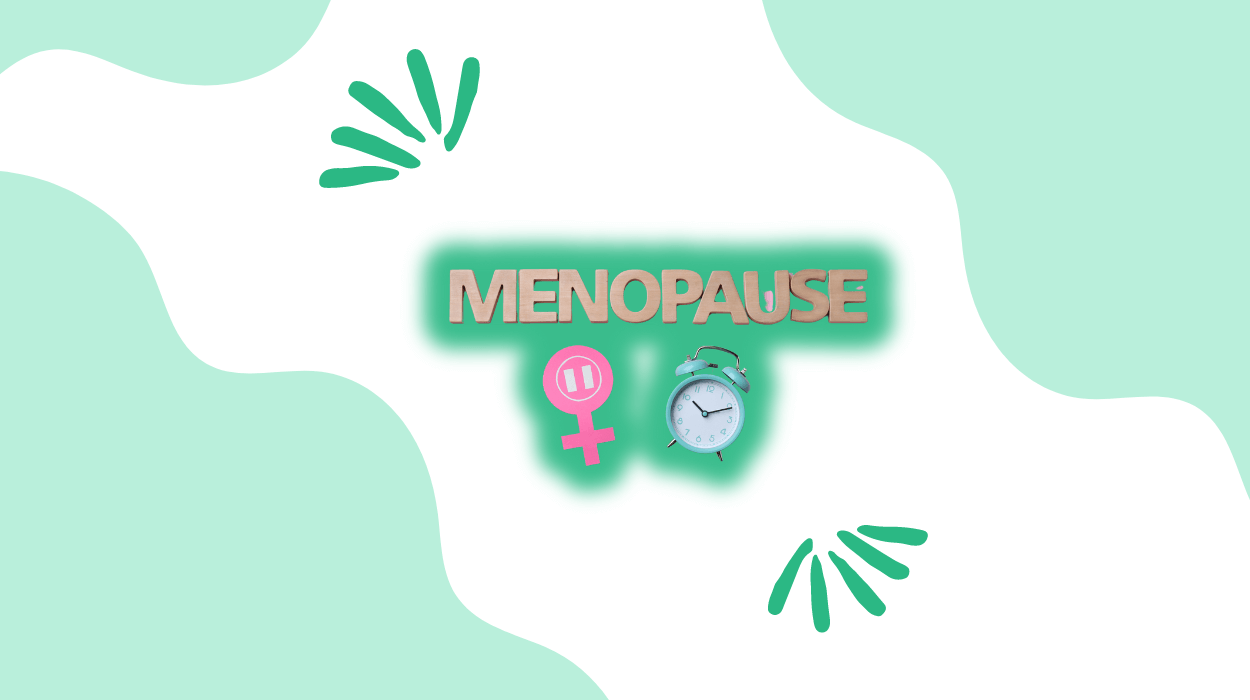

Menopause belly, or abdominal weight gain, is a common concern for many women. Your body undergoes various changes, including decreased estrogen levels, which could contribute to weight gain during menopause.
Factors such as reduced physical activity, sleep problems, and a slowing metabolism due to the natural aging process can also promote the accumulation of belly fat.
Menopausal weight accumulation around the mid-section may increase your risk of developing cardiovascular disease.
However, including practical strategies could help manage and reduce menopause belly and the risks associated with it.
This article provides a detailed analysis of menopause belly and how menopause affects weight and overall health. Read more to find out why this weight gain is happening and what you can do to lose this menopause belly fat.
During menopause, hormonal changes and age-related factors could contribute to weight gain, particularly in the abdomen. It might happen due to falling estrogen levels, which occur during menopause and can lead to an increase in abdominal fat.
Your metabolism can naturally slow down as you age, and physical activity also declines, which might cause weight gain.
Menopause belly bloat might influence gut motility and visceral perception. Sleep issues during menopause might also disrupt hormone regulation, leading to weight gain.
Regular exercise might help manage weight and reduce menopause belly, providing numerous physical and mental health benefits. Exercise could help burn calories and increase metabolism, which could help in weight loss and prevent weight gain. It promotes the preservation of muscle mass, which may help maintain a healthy body composition.
A balanced diet is essential to manage weight gain and promote overall health during menopause. You’ll need to reduce your caloric intake, increase the calories you burn, or both to lose menopause belly weight and keep it off.
Increasing your plant-based food consumption, such as fruits, vegetables, beans, and whole grains, may help manage weight during menopause. These foods contain nutrients and fiber, which might assist with weight management and enhance overall health.
Cut off or avoid processed foods, which might contribute to bloating and fluid retention. Limit high-fat, high-sugar, and high-calorie foods and snacks to prevent extra calories from adding up and contributing to weight gain.
One study mentions that a Mediterranean diet could help people in menopause lose weight. It combines fruits, vegetables, whole grains, fish, and olive oil.
However, making informed choices about your diet and taking active steps to manage a healthy weight could help manage weight during and after menopause.
Maintaining a balanced carbohydrate consumption is crucial for managing a menopausal belly and preventing after-menopausal weight gain. Research suggests that a reduced-carbohydrate diet may decrease the risk of postmenopausal weight gain.
To maintain a balanced carbohydrate intake, here are some strategies to consider:
Menopause may hinder your metabolism function, burning fewer calories daily. It means extra weight could accumulate if you don’t watch your calorie intake. It is better to avoid restaurant meals as it might lead to consuming twice as many calories as needed, which is associated with abdominal weight gain.
| Dietary Strategies for Weight Management |
|---|
|
Limit processed or refined carbs |
|
Be mindful of sugar intake |
|
Choose healthier fats |
|
Control portion sizes |
|
Consider incorporating intermittent fasting or time-restricted eating |
|
Seek guidance from a registered dietitian for personalized recommendations |
|
Cut back on restaurant meals and takeout |
|
Eat three square meals a day |
|
Start the day with a hearty breakfast containing lean protein |
|
Finish the day with a light supper |
|
Eat the main meal at noontime |
|
Avoid late-night snacking |
|
Be mindful of afternoon snacking |
|
Pay attention to your circadian rhythm |
|
Be mindful of foods to avoid during menopause |
Stress could lead to weight gain, particularly in the abdominal area. Research has shown that cortisol, a stress-related hormone, leads to fat storage in the abdomen. However, reducing stress levels could help manage weight.
Cosmetic procedures may help address menopausal belly. These procedures could help remove excess fat from the abdominal area, providing a flatter, more toned appearance.
Abdominoplasty involves withdrawing surplus skin and fat from the abdomen and tightening the underlying muscles. It could be helpful for people who have loose or sagging skin and stubborn fat deposits that are resistant to diet and exercise.
Liposuction involves the reduction of excess fat through a suction technique. It can be performed in various body areas, including the abdomen, to help contour and reshape the body.
However, these cosmetic procedures carry anesthesia, surgery, and infection risks. Consult a doctor who can assess and determine if these procedures suit you.
Abdominal obesity during and after menopause may cause significant health risks, including an increased possibility of developing gallbladder ailment, heart disease, high blood pressure, osteoarthritis, and type 2 diabetes.
In some cases, excessive weight gain around your abdominal area might be a risk factor for several types of cancer. However, future studies are warranted to understand the relationship between cancer and weight gain.
Menopause belly could be a sign of excess weight and hormonal shifts. However, excess weight gain around the belly could cause severe medical conditions. Consult a healthcare professional to find out underlying health issues.
Aerobic exercises, strength workouts, and high-intensity interval training (HIIT) could help burn calories, increase metabolism, and strengthen core muscles to reduce belly fat.
Results from lifestyle changes for reducing menopause belly could vary depending on personal factors such as genetics, metabolism, and adherence to the changes. Consult a doctor for personalized guidance and track progress over time.
Stress management methods such as meditation, time in nature, and calming activities could help reduce stress levels and associated weight gain.
Restrictive dieting is not the only way to reduce menopausal belly fat. Try to manage stress, improve sleep quality, and increase aerobic activity and strength training to strengthen and develop a toned physique.
You may experience excessive belly gain during or after menopause due to hormonal changes, reduced metabolism, or lack of activity.
Lifestyle changes may require some time and consistency. However, with the right approach, you could work on improving your overall health and well-being.
Understanding the factors causing weight gain and implementing strategies such as exercise, dietary modifications, stress management, and medical support could also help prevent or reduce menopause belly.
However, if menopause belly persists despite lifestyle changes, consulting a healthcare provider is recommended. You must seek professional advice that can help identify potential causes and appropriate treatment options.
Tyler Read earned an undergraduate academic degree from Sonoma State University, California and is a certified personal trainer (CPT) with NASM (National Academy of Sports Medicine). With over 16 years of experience, Tyler has trained clients both online and in-person.
He is passionate about helping others turn their love for fitness into a career. Tyler has worked with many local and commercial gyms before establishing his successful private personal training business, which he continues to operate.
